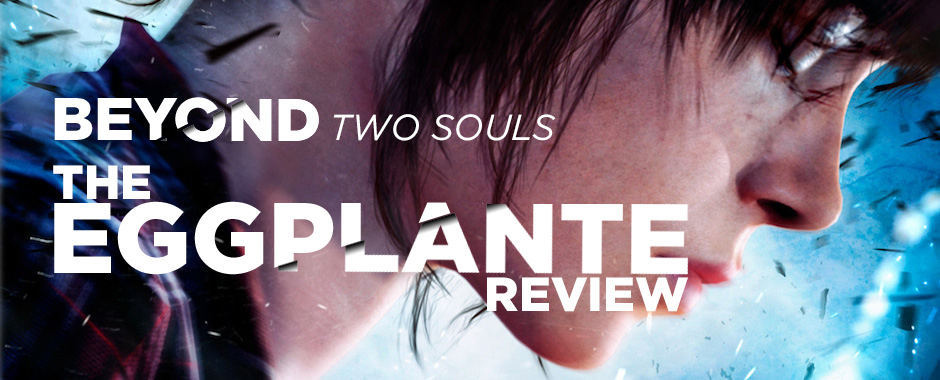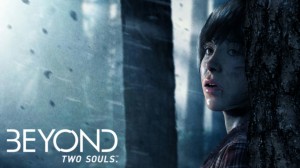 Beyond: Two Souls is one of those games that’s very difficult to put your critic finger on.
Beyond: Two Souls is one of those games that’s very difficult to put your critic finger on.
On the one hand, the premise behind the game is very cool. You also have a superb lead performance from beloved Canadian actress, Ellen Page, and some strong production values all around going for it. The polish behind Beyond: Two Souls as a package is undeniable, and it’s small wonder that the game is only the second to be featured at the Tribeca Film Festival, after 2011’s superb period detective game, L.A. Noire.
As an experience, Beyond: Two Souls is mostly compelling and memorable… But as a game, Beyond: Two Souls is a messy, frustrating and too-frequently dull experience, making the game disappointingly uneven as a final product.
Coming to us once again from the mind of David Cage and his studio, Quantic Dream, Beyond: Two Souls is the spiritual successor to 2010’s highly successful interactive mystery drama, Heavy Rain. Like Heavy Rain, Beyond: Two Souls is directly published by Sony and is exclusive to the PS3, meant to flex more of the console’s muscle as a means to bring to life more mature, lifelike interactive storytelling, and pushing the idea of what we define as a video game.
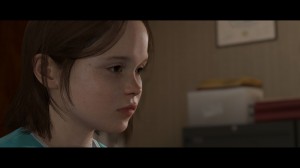 To this end, if there’s one thing really going for Beyond: Two Souls, it’s Ellen Page. Page makes the game her own, defying the muddled and sometimes confused plotline, while throwing everything behind a surprisingly sincere and likeable lead performance as protagonist, Jodie Holmes, even when things get a bit silly and unintentionally cheesy. Willem Dafoe complements her nicely in the key supporting role of paranormal researcher, Nathan Dawkins, but it’s Page that adds the entirety of the game’s heart and, ironically enough, soul.
To this end, if there’s one thing really going for Beyond: Two Souls, it’s Ellen Page. Page makes the game her own, defying the muddled and sometimes confused plotline, while throwing everything behind a surprisingly sincere and likeable lead performance as protagonist, Jodie Holmes, even when things get a bit silly and unintentionally cheesy. Willem Dafoe complements her nicely in the key supporting role of paranormal researcher, Nathan Dawkins, but it’s Page that adds the entirety of the game’s heart and, ironically enough, soul.
Beyond: Two Souls defies the style of Quantic Dream’s recent preceding efforts, Heavy Rain and Indigo Prophecy (or Fahrenheit for those outside of North America) by focusing on Jodie Holmes as a lead character exclusively, rather than the playable ensemble casts from before. The game unfolds over fifteen years of Jodie’s life, from being a confused little girl to a strong and passionate young woman, and most of the time, players control only her.
The only other playable ‘character’ of sorts is Aiden, a mysterious entity irreversibly linked to Jodie’s soul, anchoring much of the early plot of the game, or what players can likely decipher of it. You can switch perspectives from Jodie to Aiden, and vice-versa, with a simple press of the Triangle Button.
Aiden is an intangible being that only Jodie can directly interact with. As such, Jodie can give hints to the player by addressing Aiden, and players are also free to have Aiden roam around the environment to a degree, scouting around, and even procuring collectible bonus features that only Aiden can perceive. Aiden can also use his powers to open paths, move objects, heal injuries, and basically anything that Jodie may require at any given moment to proceed gameplay.
 The idea behind the Jodie/Aiden relationship is sound from a gameplay standpoint, but Beyond: Two Souls trying so hard to defy traditional video game convention often gets in the way of its potential. Since every so-called obstacle in the game is noticeably more automated than it was in Heavy Rain, using Aiden to forge ahead doesn’t feel like a natural and rewarding response to solving a puzzle or dilemma. It merely feels like the game is spoon-feeding you a blatantly scripted sequence that players simply switch to Aiden to get through, then move on. None of Aiden’s gameplay feels like it actually directly involves the player’s insight, further making Beyond: Two Souls feel like a more passive playing experience than it should be.
The idea behind the Jodie/Aiden relationship is sound from a gameplay standpoint, but Beyond: Two Souls trying so hard to defy traditional video game convention often gets in the way of its potential. Since every so-called obstacle in the game is noticeably more automated than it was in Heavy Rain, using Aiden to forge ahead doesn’t feel like a natural and rewarding response to solving a puzzle or dilemma. It merely feels like the game is spoon-feeding you a blatantly scripted sequence that players simply switch to Aiden to get through, then move on. None of Aiden’s gameplay feels like it actually directly involves the player’s insight, further making Beyond: Two Souls feel like a more passive playing experience than it should be.
Worse yet is that Aiden’s powers and capabilities are so arbitrary and poorly-defined, just doing whatever the plot demands at any given moment. Why can he choke out this enemy, but not that enemy? Why can he drift far away from Jodie in some scenes, but can barely move ten feet in others? Why can he heal a mostly-severed leg, but can’t reform a gouged eyeball? Why can he heal and protect Jodie from anything (like Heavy Rain, Beyond: Two Souls doesn’t have Game Over’s), but can’t easily shield and revive other characters at certain points? This doesn’t make the entity more mysterious. It’s just lazy writing and lazy scenario planning, turning Aiden into one giant Deus Ex Machina character with no clear scripting rules, plain and simple.
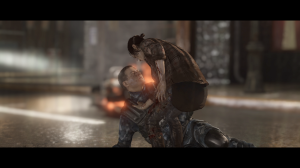 This makes ‘Duo Mode’ all the more a pointless addition to the game. Duo Mode allows a second player to control Aiden, while the first controls Jodie. Given the heavy scripting between Jodie and Aiden’s gameplay however, you would get the same effect by just passing the controller back and forth with another person whenever you switch perspectives. Given that one of the game’s Gold Trophies also demands that you play through the entire game in Duo Mode, without ever switching to the normal Solo Mode, it will probably mean that trophy hunters will spend their first playthrough awkwardly playing with two controllers.
This makes ‘Duo Mode’ all the more a pointless addition to the game. Duo Mode allows a second player to control Aiden, while the first controls Jodie. Given the heavy scripting between Jodie and Aiden’s gameplay however, you would get the same effect by just passing the controller back and forth with another person whenever you switch perspectives. Given that one of the game’s Gold Trophies also demands that you play through the entire game in Duo Mode, without ever switching to the normal Solo Mode, it will probably mean that trophy hunters will spend their first playthrough awkwardly playing with two controllers.
Of course, you also have the option of taking advantage of the Beyond Touch App for your play control in Duo Mode especially, available for iOS and Android devices. This basically lets a player use their smartphone and/or tablet as a controller for either Jodie or Aiden in lieu of the usual PS3 controller. It’s meant to substitute for the belated PlayStation Move support that was given to Heavy Rain, with Beyond: Two Souls apparently opting not to support Move controls this time. The app is little more than a pointless gimmick however, and doesn’t really add anything to the game, even as a seemingly simplified control method for the especially uninitiated, and even being a free download.
Beyond: Two Souls clearly has lots of ideas in its head, but it bites off more than it can chew, and never is this more present than in the style of the storytelling. Unlike the mostly linear progression of Indigo Prophecy and Heavy Rain, Beyond: Two Souls jumps around the various fifteen-year period of Jodie’s life at pure random. This odd narrative style is somewhat explained in the game’s (variable) epilogue, mostly regardless of which of the eleven endings you achieve. Still, it’s a pointless narrative device that just makes the story even more difficult to follow. There’s no reason why these events could not be told in a linear manner, or even a straightforward frame narration!
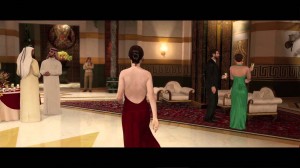 Another problem with Beyond: Two Souls as a gaming experience is that it introduces potentially exciting ideas and sequences, including an immersive military mission and a gripping late night escape from the authorities, but only features them in one chapter before abandoning them. This makes some of the game’s trailers feel rather dishonest, since they emphasize a lone exciting sequence in the game, but said sequence never shows up more than once. The advertising makes Beyond: Two Souls appear to be a far more interesting game than it actually is.
Another problem with Beyond: Two Souls as a gaming experience is that it introduces potentially exciting ideas and sequences, including an immersive military mission and a gripping late night escape from the authorities, but only features them in one chapter before abandoning them. This makes some of the game’s trailers feel rather dishonest, since they emphasize a lone exciting sequence in the game, but said sequence never shows up more than once. The advertising makes Beyond: Two Souls appear to be a far more interesting game than it actually is.
Further exacerbating this issue is Beyond: Two Souls’ frustrating inability to pick a tone. In one scene it’s an emotional drama. In the next it’s a fast-paced action-adventure. In the next, it’s a paranormal thriller. In the next it’s a harrowing horror story. In the next, it’s a goofy romance. Then, the tone goes back to one of the other genres, and, like the story events, hops around at random. Tonal consistency. Narrative continuity. Setup and payoff. This is Fiction Writing 101, David Cage, for any entertainment medium, not just video games! Come on!
Yet, for all of its heaps of slow-paced gameplay, needlessly confusing plotting and frustrating missed opportunities in the mechanics, Beyond: Two Souls is still worth a look for fans of Quantic Dream’s unique brand of interactive drama, even if it’s a considerable step down from the much more well-realized Heavy Rain. Ellen Page’s incredible performance makes Jodie’s journey worth undertaking, elevating the material at every turn. Even with all of the sloppy and/or incoherent storytelling, there are also still a handful of more emotional, heart-wrenching scenes that really work very well, and will no doubt leave players misty-eyed, though we obviously won’t spoil these.
 If you enjoyed Heavy Rain especially, our advice is to wait for a price drop. Beyond: Two Souls is worth playing for PS3 gamers that enjoy Quantic Dream’s work, but not at the hefty price of $59.99. When the price drops to about half that sum or less, we can more readily recommend Beyond: Two Souls, particularly for trophy hunters. Like Heavy Rain, it’s not difficult to attain Beyond: Two Souls’ Platinum Trophy, if you’re simply willing to put in a small time investment, and put up with some slight tedium that comes with replaying the same passive gameplay sequences more than once.
If you enjoyed Heavy Rain especially, our advice is to wait for a price drop. Beyond: Two Souls is worth playing for PS3 gamers that enjoy Quantic Dream’s work, but not at the hefty price of $59.99. When the price drops to about half that sum or less, we can more readily recommend Beyond: Two Souls, particularly for trophy hunters. Like Heavy Rain, it’s not difficult to attain Beyond: Two Souls’ Platinum Trophy, if you’re simply willing to put in a small time investment, and put up with some slight tedium that comes with replaying the same passive gameplay sequences more than once.
Beyond: Two Souls is ultimately a bit of a disappointment, and deserved to be better than it is, but it has enough redeeming qualities to at least intrigue interested enthusiasts of Quantic Dream. That said however, Heavy Rain remains the studio’s crowning achievement for the PlayStation faithful at this point, so adjust your expectations accordingly.

